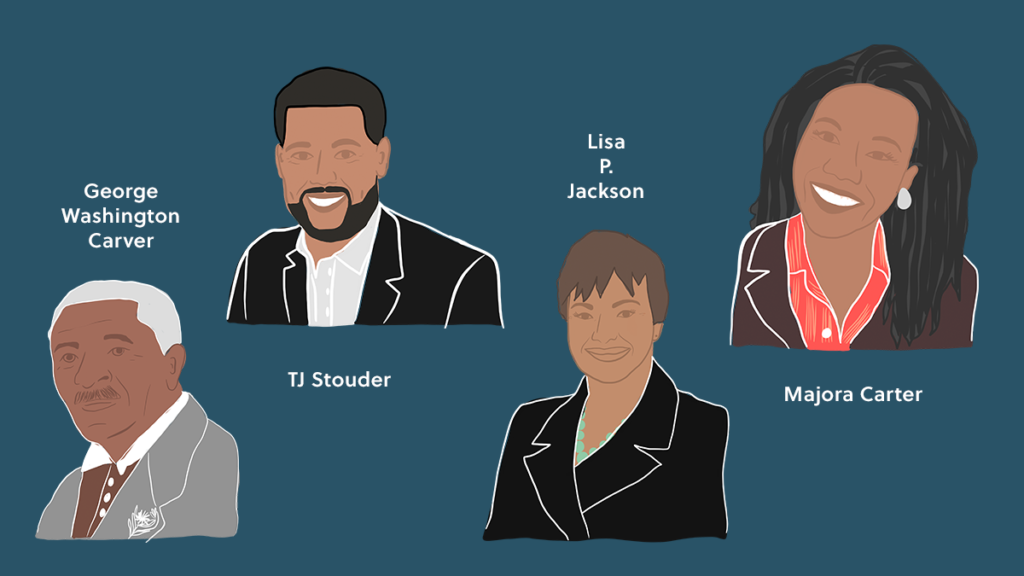Since 1976, every U.S. president has officially designated February as Black History Month. It’s a time to celebrate the achievements of Black Americans and brings forth the central role the community has played in our history.
The official celebration of the accomplishments of Black Americans goes back even further though. In 1926, the second week of February became Negro History Week. The dates were set to coincide with the birthdays of both Abraham Lincoln and Frederick Douglass. Organized by what’s now known as the Association for the Study of African American Life and History, the group was founded in 1915 by Carter G. Woodson and Jesse E. Moorland.
Today, the contributions of Black Americans are recognized in every industry, across all fields, so we’d like to celebrate the impact individuals and Black-run organizations have had on our environment.

A few standouts
It’s easy to find Black Americans who have made a contribution to the well-being of our planet. We’re all working in big and small ways in our environment, but here are just a few individuals whose impact we can see today.
George Washington Carver, agricultural scientist and inventor
You probably learned about him in school as the peanut expert, but the ideals George Washington Carver had about the environment are still relevant today. Carver felt that it was a man’s duty to interact with nature, and worked to grow food specifically to feed impoverished populations. His outlook is evoked within many of our current environmental concepts.
TJ Stouder, CEO HOLISTIK Wellness
A modern company on a mission, HOLISTIK Wellness offers CBD wellness powders. You pour the powder into your drink, and use the recyclable STIK it came in to stir. You end up with less waste than having to grab a separate stirrer. Not only thinking about sustainability in their products, TJ Stouder decided to go above and beyond. Partnering with IMPACT COLLECTIVE, he’s working to reduce his company’s plastic impact by going plastic negative. This means for every STIK sold, 4x the amount of plastic used will get removed from the environment. Big change can come in a single STIK!
Lisa P. Jackson, chemical engineer and former Administrator of the EPA
From 2009-2013, Lisa P. Jackson served as the first Black Administrator of the United States Environmental Protection Agency. While with the EPA, Jackson concentrated her efforts on climate change, air quality, protecting America’s waters, chemical safety, and cleaning up local communities. She expanded the conversation on environmental justice and made it a priority to improve outreach to communities historically under-represented when it came to environmental action.
Majora Carter, activist
Seeing environmental injustices within her own community in the Bronx, Majora Carter, set her sights on change. She is fighting to break the cycle of neglect in this New York City borough by integrating sustainable programs. She helped establish Hunts Point Riverside Park, a section of the Bronx River Greenway, as well as founded Sustainable South Bronx, an organization committed to improving the environmental and economic state of the area. She continues to focus her attention on what she can achieve in her own backyard as a leader in sustainable business.
Environmental justice — an issue we can all get behind
Each environmental leader above has one thing in common. They all take environmental justice seriously. Caring for the environment isn’t an isolated issue. Its impact on racial justice is real.
Race, income, even zip code all contribute to the access you have to clean air and water. People of color and low-income communities are more likely to be near known polluters and more likely to suffer from heat waves and floods.
Climate change is a huge issue for minorities in the United States. And when individuals, organizations, and nonprofits speak out about it they’re striving to not only help people suffering, but also to make our environment better for everyone.
To those who are lending their voice to this cause — thank you.
It’s something we care deeply about at IMPACT COLLECTIVE, which is why we help companies find the proper outlet for their sustainable goals and environmental hopes. We’re here to help facilitate the changes that can make our world a better place in more ways than one.
Looking to offer your support?
It’s amazing how many Black-owned, environmental non-profits there are out there. This is a few to get you started, but please take the time to do your own research, seeking out organizations in your community that need your help.
- League of Conservation Voters Education Fund — plays a major role in the climate fight and in land and water rights. They work to put environmental issues out in front in Washington, D.C..
- OPAL Environmental Justice — fights for environmental justice by creating meaningful opportunities for members to get involved in the decisions impacting their communities.
- Outdoor Afro — connecting people to Black history found in nature while inspiring communities to protect vulnerable public lands.
- Land Loss Prevention Project — works to stop land loss in Black communities across North Carolina.
- WE ACT for EnvironmentL Justice — organizes and engages in community-based planning while empowering low-income, people of color to build healthy communities.
- The Urban Creators — founded in North Central Philadelphia, this group is working to bridge the gap between isolated communities while transforming a two-acre garbage dump into a farm.
- MN350 — unites Minnesotans to fight against pollution.
For more information and resources on Black History Month and Environmental Justice, please visit: https://www.africanamericanhistorymonth.gov/ and https://www.epa.gov/environmentaljustice/learn-about-environmental-justice


